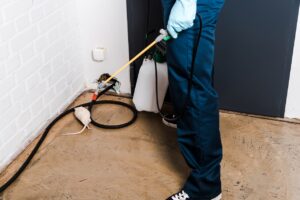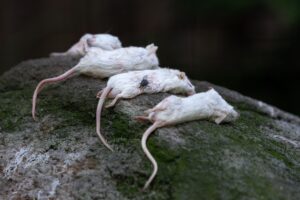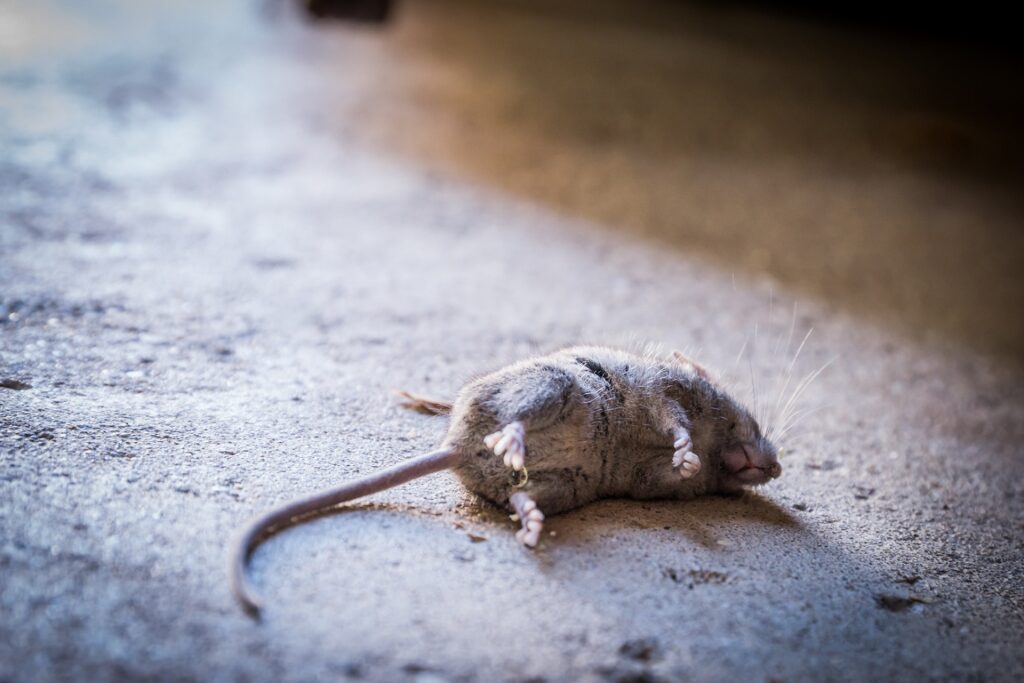What can you do when there’s a dead mouse smell in your home but you can’t find the mouse?
Understandably, this issue can bring frustration and concern for you, but don’t fret as we are here to guide you on how to deal with the lingering smell of a hidden mouse.
We’ll give you effective solutions and also share insights on detecting, eliminating, and spotting other signs of mouse infestations in your home. So if you’re interested, keep reading!
How Can You Detect Where The Dead Mouse Smell Is Coming From?
One of the most confusing aspects of a dead mouse smell is identifying its origin. Here are some practical tips to help you narrow down the search:
– Follow your nose
Trust your sense of smell and follow the odor trail. Pay attention to the areas where the smell is most potent.
– Use a blacklight
Shine a blacklight lamp in dark corners, as the fur and urine of rodents can be detected under ultraviolet light. This may lead you to hidden areas where the mouse may have died.
– Check common hiding spots
Inspect common rodent hideouts, such as behind appliances, in wall voids, or under cabinets. These animals tend to seek shelter in secluded, warm areas.
– Ventilation system inspection
Examine your home’s ventilation system as the odor might be circulating through the ducts. A thorough cleaning might also be necessary.

How Long Does The Dead Mouse Smell Last?
The duration of the pungent odor left behind by a deceased animal can be a source of great anxiety for the home’s occupants.
In general, if you can’t find the dead mouse, the smell may persist for up to several weeks but it will eventually dissipate with time, although it’s important to try to find and get rid of the source for sanitary reasons.
However, several factors influence how long the smell lingers, which makes it crucial to understand these elements to effectively manage the odor.
Size of the mouse
The size of the dead mouse plays a significant role in determining how strong the odor will be and how long it will last. Larger rodents generally produce more odor due to their increased mass. In contrast, smaller mice might produce a milder scent that dissipates more quickly.
Temperature and humidity
Environmental conditions, particularly temperature and humidity levels, can affect how quickly the smell dissipates. Warmer temperatures tend to accelerate the decomposition process, intensifying the odor. Additionally, higher humidity can contribute to the persistence of the smell by slowing down the natural evaporation of odor particles.
Ventilation
Proper ventilation is essential for reducing the longevity of the unpleasant odor. Well-ventilated spaces allow odor particles to disperse, which helps clear the air more efficiently. In contrast, poorly ventilated rooms trap the smell, prolonging its presence.
Use of odor neutralizers
Using odor-neutralizing agents or air purifiers can go a long way in mitigating the duration of the smell. These products work by breaking down and neutralizing the odor molecules, providing a more immediate solution to the problem.
Cleaning and deodorizing
Thoroughly cleaning the affected area and employing deodorizing agents can expedite the dissipation of the smell. Specialized cleaners designed to eliminate organic odors help eradicate the source and leave the space smelling fresh.
Patience and time
Patience is key when dealing with the aftermath of a deceased rodent. While it may be tempting to expect immediate relief, it is important to allow time for natural processes and remedies to take effect. Most mouse-related odors gradually diminish within a few weeks, with consistent efforts to eliminate contributing factors.

Is The Dead Mouse Odor Harmful To Your Health?
While the dead mouse odor itself is not harmful, the presence of a dead rodent can attract insects and other pests that may carry diseases. Therefore, it is crucial to handle the situation promptly and take preventive measures to safeguard your health.
– Insect infestation risk
It is essential to deal with the deceased mouse promptly to prevent the attraction of insects like flies, cockroaches, and beetles that may carry harmful bacteria.
– Protective gear
If you decide to handle the situation yourself, wear gloves and a mask to minimize contact with potential contaminants.
– Proactive cleaning
Regularly clean and sanitize the affected area to mitigate health risks associated with the presence of pests.
Should You Also Look For Other Signs Of Mice Infestation In The Home?
The odor of a dead mouse might mean that there are more rodents nearby. Discovering a dead mouse might signal a larger problem – a mouse infestation. Here are some signs to look for:
– Droppings and urine
Check for mouse droppings and urine stains, especially in hidden corners and along baseboards.
– Gnaw marks
Inspect furniture, wiring, and cardboard boxes for gnaw marks, a clear sign of rodent activity.
– Scratching noises
Pay attention to any scratching or scurrying sounds in walls or ceilings, especially at the night.
– Nests
Look for nests made from shredded materials, such as paper or fabric, in secluded areas.
Dealing with the smell of a dead mouse can be a difficult task, but with the right approach, you can tackle the issue head-on. Remember that acting quickly is crucial to prevent potential health hazards and further infestations. By following the tips outlined in this article and taking proactive preventive measures, you can keep your home rodent-free and enjoy a fresh, odor-free living environment.
However, if your efforts to locate and eliminate the source of the smell prove futile, it’s time to call in the professionals. Pest control experts have the knowledge, tools, and experience to handle infestations effectively and ensure long-term prevention.
When in doubt, do not hesitate to reach out to our Peachtree Pest Control team in Atlanta to ensure a thorough and effective resolution.
